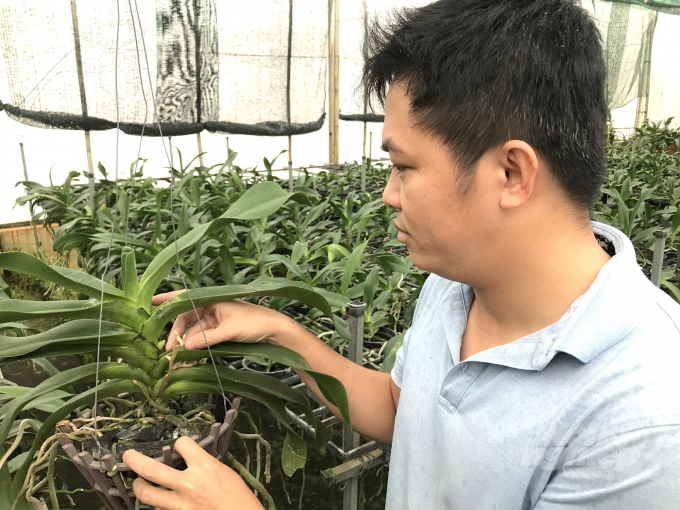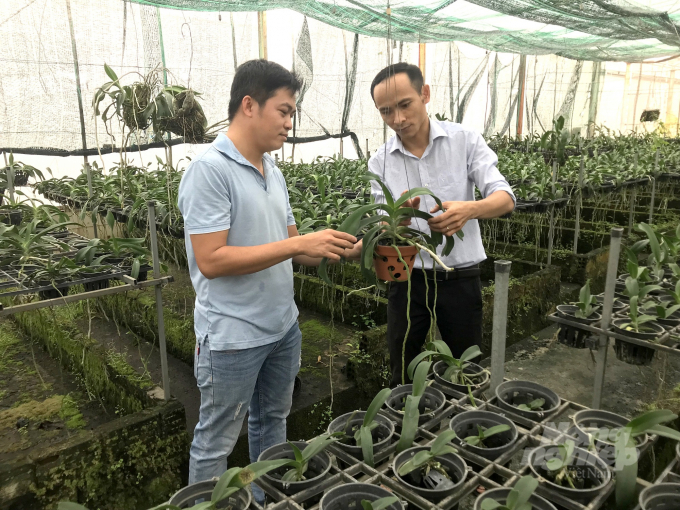November 27, 2025 | 22:30 GMT +7
November 27, 2025 | 22:30 GMT +7
Hotline: 0913.378.918
November 27, 2025 | 22:30 GMT +7
Hotline: 0913.378.918

Dai Chau orchid is a precious variety, which has a high economic value. Photo: Vu Dinh Thung.
According to Master Le Duc Dung, Deputy Head of the Department of Vegetables, Flowers and Ornamental Plants, of the Institute of Agricultural Science and Technology of the South Central Coast, Dai Chau orchid is endemic to the natural forest of An Lao district (Binh Dinh province). ) and grows mainly in areas above 600 meters above sea level.
Dai Chau orchid belongs to the group of single orchids. Its trunk has a beautiful shape, grows upright, has strong roots, glossy green leaves, and twists without leaf stripes like Dai Chau orchids from Thailand and Laos.
The leaves of Dai Chau orchid grow horizontally, curved down symmetrically. The trunk is stacking in 2 rows that grow opposite each other. Leaves on one row alternate with leaves of the other row, leaf length from 30–40 centimeters, leaf width 4–5 centimeters. Dai Chau orchid's flower is 20–40 centimeters long, white with purple spots, purple flower borders.
Dai Chau orchid usually blooms in January. Flower durability is from 25-30 days, so it is trendy. Significantly, the flower scent is fragrant, which is the great advantage of Dai Chau orchids distributed in the An Lao forest.
Dai Chau orchid is a precious orchid, which has a high economic value. Over the years, before the growing demand for forest orchids, the value of Dai Chau An Lao orchid has increased.
Each Dai Chau An Lao orchid for the first year of flowers costs about VND 2 million. Therefore, despite the danger, many people crept into the deep forest to exploit and destroy, leading to the depletion of natural Dai Chau orchids and a high risk of losing genetic resources.
Besides, like others, Dai Chau orchid's seeds do not have endosperm, so they do not germinate themselves under normal conditions. Still, they must be symbiotic in special requirements to have the ability to grow.
The human exploitation process also makes the number of orchid seeds dispersed in nature less and less. In addition, climate change and human impacts have narrowed the natural forest area, causing the loss of suitable habitat for Dai Chau An Lao orchid. Therefore, under natural conditions, seeds are difficult to germinate and develop into seedlings, increasing the risk of extinction of this precious orchid.

Master Le Duc Dung, Deputy Head of the Department of Vegetables, Flowers and Ornamental Plants, of the Institute of Agricultural Science and Technology of the South Central Coast. Photo: Vu Dinh Thung.
Faced with the above situation, the research team of the Institute of Agricultural Science and Technology of the South Central Coast collected Dai Chau's fruits from An Lao forest at the physiological ripe stage, then applied the tissue culture method (in-vitro multiplication) to preserve and develop the Dai Chau precious orchid variety.
According to Master Le Duc Dung, the in-vitro multiplication can be applied to many different plant species. The ratio of using nutrients such as macronutrients, trace elements, vitamins, and growth regulators varies depending on the plant.
Each laboratory has its technological know-how applied to different plants such as chrysanthemums, orchids, and forestry seedlings. In addition to nutritional factors, light and temperature factors are also very important in the culture process.
The Institute of Agricultural Science and Technology research team in the South Central Coast collects fruits from trees that grow and develop well without being infected with pests and diseases to put them into culture under sterile conditions. The time from sowing seeds into the nutrient medium to germination takes about two months.
After that, the Institute of Agricultural Science and Technology of the South Central Coast continued to select healthy embryos to transfer to the seedling creation medium. After two months, the plants continued to be transplanted to the complete plant growth medium.
When plants have 4-5 roots, 2 leaves, they are gradually used to temperature and light in nursery conditions, improving the survival rate of seedlings when planted.
"We have applied in-vitro culture technology to be able to conserve, exploit and use the genetic resources of precious Dai Chau orchid for 5 years, to both meet the market demand for a large number of plants, and contributing to preserving the genetic resources of Dai Chau orchid in An Lao forest", said Master Le Duc Dung.

Leaders of the Department of Vegetables, Flowers and Ornamental Plants of the Institute of Agricultural Science and Technology of the South Central Coast in Dai Chau orchid garden. Photo: Vu Dinh Thung.
Because Dai Chau orchid in the wild currently is exhausted, orchid growers who want to own a natural orchid have to spend up to VND 2 million. Meanwhile, Dai Chau orchid grew by the Institute of Agricultural Science and Technology of the South Central Coast, only has a price of VND 300,000 per plant.
Many customers in Binh Dinh province or from Ho Chi Minh City and many other areas know the value of Dai Chau An Lao orchid, so the demand to buy increases. "The age of the tree determines the price of the orchid. The older the orchid, the longer the flower, and the more brilliant the flower blooms," said Master Dung.
According to Dr. Vu Van Khue, Deputy Director of the Institute of Agricultural Science and Technology of the South Central Coast, the application of tissue culture technology in the propagation of Dai Chau An Lao orchid is significant because besides the economic value, it helps to conserve precious genetic resources that are at risk of being lost in the wild.
"Because Dai Chau An Lao orchid is sown from seed, there is unevenness in morphology, flower color, growth strength, and tolerance. Therefore, in the upcoming time, from the population of 5-year-old trees that the Institute is keeping, the research team will conduct a selection of quality trees, then apply growth apex culture technology to create evenly healthy seedlings, and maintain the rare characteristics of the original variety", said Dr. Vu Van Khue.
Translated by Ha Phuc
/2025/11/27/3830-1-152901_403.jpg)
(VAN) Dong Nai is developing its key crop areas, expanding planting area codes, and applying high technology to increase the value of agricultural products, aiming at a green and sustainable agriculture.

(VAN) Tay Ninh’s livestock sector is undergoing a major transformation, applying high-tech, closed-loop circular models to build sustainable value chains.
/2025/11/26/3627-4-082628_818.jpg)
(VAN) From a small café on the red basalt highlands, Le Van Hoang started a business with clean coffee, building Enjoi Coffee into a symbol of organic agriculture in the Lam Dong plateau.
/2025/11/25/0045-1-135246_13.jpg)
(VAN) Ca Mau is researching a model of sea-encroaching embankments combined with viaducts and logistics service zones, aiming both to prevent erosion and create land funds for marine economic development.

(VAN) The information was shared at the seminar 'Urban Agriculture - Solutions for Developing Green Spaces,' organized by the Kinh te & Do thi Newspaper and the Biotechnology Center of Ho Chi Minh City.
/2025/11/19/4141-2-132831_216.jpg)
(VAN) One of Japfa's outstanding solutions is implementing digital transformation and artificial intelligence (AI) to optimize operations, enhance productivity, and advance sustainable development.
/2025/11/19/4847-1-093540_448.jpg)
(VAN) The Gia Lai Provincial People’s Committee had a working session with the delegation of the U.S. Department of Agriculture, the State of Idaho, and representatives of the State's leading enterprises.